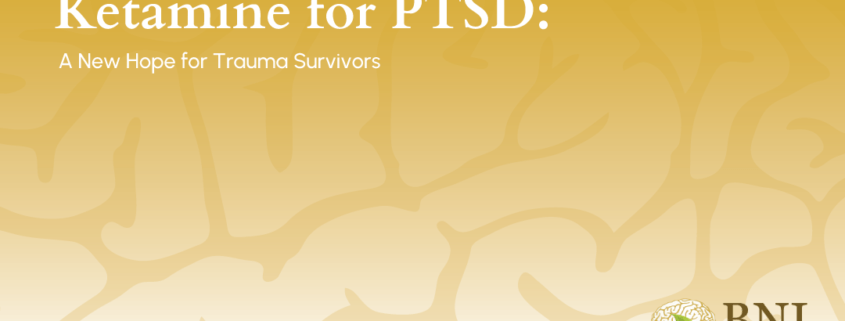Ketamine for PTSD: A New Hope for Trauma Survivors
5% of the United States population reports PTSD each year. Many will undergo treatment and recover. For some, it isn’t that simple.
That doesn’t mean they can’t overcome PTSD. It just means they need something different than traditional psychotherapy. They need options.
Ketamine therapy for PTSD is a promising choice. Studies indicate its efficacy in treating the condition, and it does so quickly. This can make a significant difference in people’s lives, especially if they experience symptoms such as suicidal ideation alongside PTSD.
How does ketamine for PTSD work at BNI Clinics? What evidence supports it becoming a viable treatment modality? We’ll go over that in this short report.
Understanding Ketamine Therapy: How Does It Work?
At high doses, ketamine is an anesthetic. Ketamine therapy utilizes a far lower dosage through an intravenous infusion.
The ketamine treatment itself lasts for approximately 40 minutes. Full sessions, start to finish, can last anywhere from an hour to two and a half hours. The person undergoing treatment will be observed before leaving to ensure no complications, contributing to the length. Some individuals experience dissociative effects, drowsiness, difficulty speaking, dizziness, or nausea. These effects are not cause for concern, and are why providers monitor anyone undergoing ketamine therapy after treatments. They tend to subside within a few hours.
How often an individual attends ketamine therapy sessions depends on their condition and the clinic. Six sessions over multiple weeks are common. Someone will typically feel results quickly, and treatment can be adjusted based on the client’s experience with ketamine therapy. People with more severe symptoms may require more sessions than others, but experts are still researching the most effective timeline to deliver treatment.
It’s important to note that ketamine therapy is not a “cure” for PTSD for the majority of people. It is a valuable tool, but maintaining other forms of treatment, such as psychotherapy, is vital to a full recovery. It is also critical to communicate with your practitioner if you undergo ketamine therapy, both about positive and negative effects.
How Can Ketamine Therapy Help With PTSD?
Sometimes, individuals with PTSD are prescribed anti-depressants to help manage their symptoms. Anxiety medications are also a possibility. These may help some people, but for many, they do not. If they do help, it often takes months to see results.
Ketamine therapy provides far quicker relief for treatment-resistant depression and anxiety alike. The help it offers for these symptoms allows individuals to focus fully on healing from traumatic memories. However, there is more to ketamine therapy for PTSD.
Ketamine lowers the activity of N-methyl-D-aspartate (NMDA) receptors in the brain, impacting the neurotransmitter glutamate. All are related to memory and cognitive function. Few other psychiatric medications directly impact this area.
Studies have shown this is important: When combined with exposure therapy, individuals who underwent ketamine therapy experienced less of a fear response to traumatic stimuli than the control group who took a sedative. Evidence also indicates positive changes to parts of the brain involved in retrieving memories.
The Research Supporting Ketamine Infusion Therapy for PTSD
The meta-analysis linked at the beginning of this page is rich with indications of ketamine therapy’s efficacy for PTSD. Here is a summary of the findings:
- The remission rate of PTSD after six ketamine therapy treatments was 80%. Effects lasted, on average, 41 days.
- Patients with comorbid PTSD and chronic pain experienced a reduction in symptoms for at least 7 days after treatment.
- PTSD symptoms decreased significantly 24 hours after ketamine therapy.
- 67% of participants responded to ketamine therapy versus 20% of individuals in the sedative control group.
- Higher-dose ketamine infusions decreased PTSD symptoms in veterans by 44%.
Ketamine therapy is an object of significant study, for PTSD and other conditions. Research is ongoing and sure to produce more meaningful results, helping us improve treatment and provide better care.
Finding Ketamine Treatment in Los Angeles
If you or someone you love is having difficulties managing PTSD, ketamine therapy is an option to consider. It offers an alternative approach to medication and traditional psychotherapy alone, with positive results. Don’t be afraid to contact a ketamine clinic near you for more information. It may bring you one step closer to overcoming PTSD.
BNI Clinics serves individuals of all ages in the Los Angeles, California area. Ketamine therapy is just one of our many offerings. We also provide transcranial magnetic stimulation (TMS), a host of evidence-based therapies, and medication management. Clients can come to us for psychological testing and continue with us for group and individual therapy sessions. We are here to assist you. Contact us at (310) 691-5005 to take the next step in conquering PTSD today.
BNI Clinics: Science-based, evidence-backed, compassion-led.






